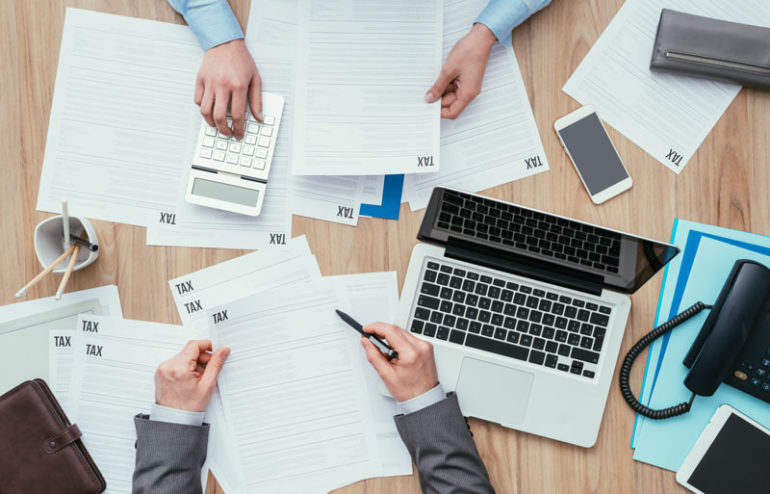As a small business owner, freelancer, or self-employed individual, you’re required by law to submit annual tax returns to the CRA (Canada Revenue Agency). However, it is best that you do not focus on filing your taxes days or weeks to the due date. As a small business owner, it is essential that you be mindful of your taxes all year round if you want to maximize your credits and deductions and to reduce the amount of taxes owed. Since calculating taxes can be complicated, make sure that you avoid the following common mistakes when it comes to filing annual returns.
1. Failing to Write Off Business Expenses
If you’re self-employed, Canada Revenue Authority allows you to deduct a reasonable amount of incurred expenses to earn income. Expenses that qualify include memberships, subscriptions, and business fees; startup costs like interests paid on business loans; fees for legal, accounting, and other professional services; telephone and other utility bills; and employee wages, benefits, and salaries.
Additionally, if you use your home or your vehicle as business assets, you should be able to deduct related expenses as well. Failing to identify your qualifying expenses and claiming them as deductions could lead to a larger taxable income.
2. Claiming Expenses That Aren’t Deductible
Another mistake most people make is claiming expenses that aren’t deductible. CRA considers claiming unnecessary expenses a failure to declare income. If Canada Revenue Authority were to reevaluate your tax returns, you could end being charged penalties and interest on the undeclared income from the date you filed your tax return to the day you pay the extra tax.
For instance, not all home offices are eligible for home office deductions. To qualify, your home office space must be used exclusively to host regular meetings with your customers and clients and for business – the space has to be your principal place of work. If you only use your home office for 25% of the work you do, then it does not meet the set requirements to qualify for home office deductions. If you meet your clients at your home office on a regular basis but also use the space for your own personal use, it still won’t meet the requirements to qualify for deductions.
3. Forgetting To Track Your Expenses
Irrespective of how well you comprehend self-employment deductions, they can quickly become hard to account for if you forget to track them as the year progresses.
Instead of trying to remember your expenses or locking up your receipts in a drawer, make sure to keep accurate records by recording/tracking all business expenses as soon as you make them. The good thing is that there is a range of free smartphone apps and software available for small-business owners that can help ease recording of expenses as they happen.
4. Not Reporting Trade or Cash Payments
If you accept trade in exchange or cash for work, you’re still required by law to report it. In fact, Canada Revenue Authority has severe penalties put in place for freelancers or contractors who fail to report their cash payments. If they find out that you do not indicate your cash payments, you could be assessed for penalties, taxes, and interest, in addition to court fines and possible jail time.
Similarly, if you take payments in trade, you are required to report the equivalent monetary value of the items you receive as income on your return. For instance, let’s say you own a catering company and accept payment from a customer in the form of free dog training for your pup, you are required to claim the retail value of dog lessons as your income on your returns.
If you wish to know more about HST/GST – here is a good post about GST in Canada
5. Insufficient Proof Regarding Entertainment and Meal Costs
Freelancers and self-employed individuals can claim partial deductions for entertainment and meals on line 8523 when filing their tax returns. You could deduct up to 50% of entertainment and meal expenses incurred on traveling for work or expanding your business.
In some instances, like when hosting a holiday party for your staff or when procuring food for a charity lunch, you could deduct all of the expenses. Moreover, if you’re a long-haul truck driver, you should be able to claim up to 80% of your meal expenses. Likewise, if you’re a self-employed rickshaw driver or courier, you are entitled to a flat rate of $17.50/day.
However, you’ll have to save more than the receipts for these overhead costs. You will also need to prove to Canada Revenue Authority that your expenses were necessary for the betterment of your business.
If you’re writing off business entertainment or meal expenses, then remember to set apart some moments after every event to record who came, what you discussed during your meeting, and its relation to your business. Remember to save these notes and receipts electronically or physically. In the case of rickshaw drivers, couriers, and truck drivers, maintain a log that shows when you worked, and the places you traveled.
Helpful Article: Top Accounting Firms UK



